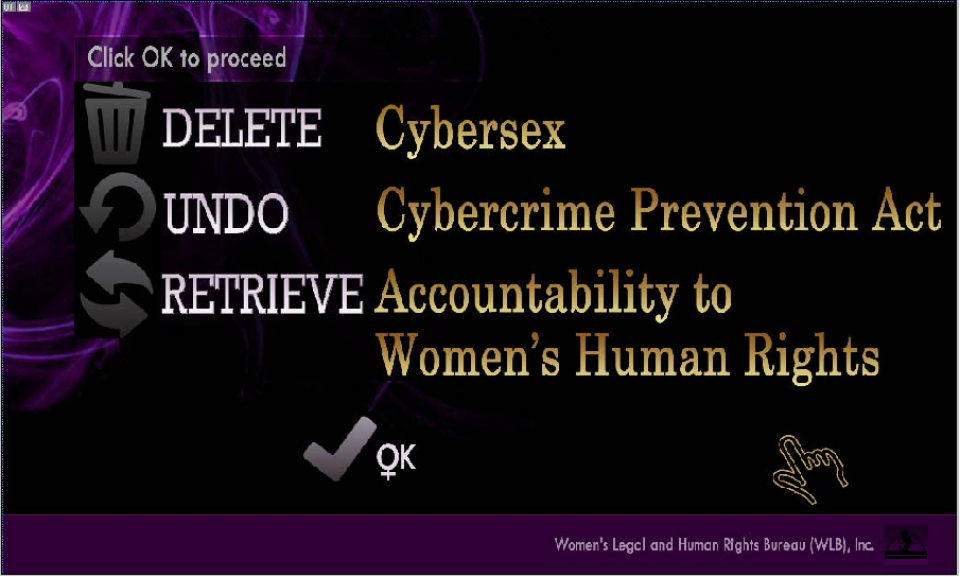
Important note: They are still in the process of gathering support and you are invited to sign on to show your support to the cause.
Statement on the Cybercrime Prevention Act of 2012
We oppose the Cybercrime Prevention Act of 2012 because of its overbroadness and vagueness. The law aims to prevent and combat crimes occurring in the cyber space. However, the sweeping and contentious definitions as well as the protective mechanisms in the law trample on the right to freedom of expression and liberty which are guaranteed by our Constitution. We cannot accept that certain provisions in the law undermine our fundamental human rights.
We reject the cybersex provision of the law for being vague. While the law presumably addresses sexual violence committed online, which are exploitative and harmful particularly to women, the vagueness and overbreadth of cybersex as content-related offense create a different impact on women, who will be the ones caught up in its wide web and targeted for criminal prosecution.
Moreover, the elements of the crime under the cybersex provision are not well-defined, therefore the law poses more harm to women who are usual victims of sexual violence in cyberspace. The law fails to concretely define what constitute the violation under the cybersex provision of the law. If the intent of the law is to suppress the occurrence of syndicated and exploitative cybersex, the measure may be ineffective as it fails to consider the transnational nature of sexual violence in cyberspace where site owners or operators and the buyers are beyond the jurisdiction of the Philippines. It will only succeed in arresting women found in local cybersex dens and putting them behind bars.
The law could be used to further perpetuate violence against women.
Laws and the legal system are powerful spaces that shape public discourses. Indeed, the legal system is a venue where women engage to seek positive recognition and protection of their rights. Over the years, women secured gains in this arena. However, a law like RA 10175, which does not specify and define the acts covered by the cybersex provision and is not clear on how it relates to other laws protective of women, runs the risk of being used against the very human beings it seek to protect- the women.
This is why we call for caution and judiciousness. Our engagement with the legal system through the years have shown that women have so far experienced little gains in accessing justice – there are very few cases filed and there are even fewer cases won, not to mention the unequal access to resources, gendered-based myths and misconceptions that pervade the justice system and a society that tolerates or even promotes sexist ideas and practices. The legal system is just another site for men to harass women as laws are used to file retaliatory suits against women.
The passage of the law is reacting to the increasing violations and crimes committed and perpetrated through information and communications technology (ICT), and focuses solely on criminalization, unmindful of its possible effects and without clear understanding of the inherent nature and characteristic of ICTs relating to violence committed against women. Hence, we oppose RA 10175 because of its possible detrimental effects to women.
Ensure women’s access to justice.
Criminalization of sexual behavior or activity will not fully address the underlying causes of violence against women. Sexual violence both online and offline is systemic – it continues to be pervasive because of the failure of the Philippine Government to progressively change constructs, norms and beliefs that are discriminatory to women. The Philippine Government continues to fail to provide protection and build supportive environment for women, and in so doing, contributes to the persistence of a culture of violence against women.
Instead of simply criminalizing cybersex, the Philippine Government must have concrete programs to prevent sexual violence in cyberspace by promoting human rights for all and harnessing ICT’s potential to promote women’s empowerment. We must look beyond the law, and beyond seeing women as victims; the law should instead promote women
as agents of change. The Philippine Government must also ensure that this law is consistent and at par with other laws and human rights treaties signed by the Philippine Government.
The Philippine Government failed to ensure transparent, adequate, informed, and meaningful consultation with civil society organizations and other stakeholders. The human rights based approach mandates that legislation involve broad-based, real participation, especially women in light of the possible differentiated impacts. Indeed, the current public panic may have been avoided if the government acted with due diligence, and was sincere in engaging its citizens. This is the exact opposite
of PNOY Administration’s slogan of “daang matuwid” and accountability to the people.
Women’s participation and representation in these processes should have been ensured, as integral to their rights-claiming and access to justice. As Frank La Rue, the United Nations Special Rapporteur on the promotion and protection of the right to freedom of opinion and expression, stressed, the government must recognize
that women’s rights in relation to ICT should be promoted, cognizant of women’s empowerment and the exercise of freedom of expression based on the agreed international standards.
We call on the government to fully implement and strengthen existing laws that protect women against violence.
We urge the government to put up effective mechanisms and concrete programs to promote women’s empowerment, including in cyberspace.
We strongly reject this law which merely strengthens existing stereotypes and systemic violence against women, and demand government’s accountability to women’s human rights. The Philippine Government must never forget its obligation to promote and protect women’s rights in ICT.
The Women’s Legal and Human Rights Bureau (WLB) is a feminist legal non-government organization from Philippines composed of women’s rights activists and advocates.
- 8280 views





Add new comment